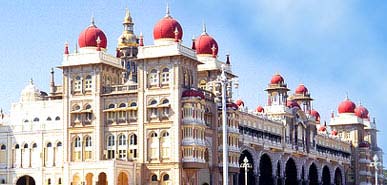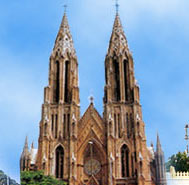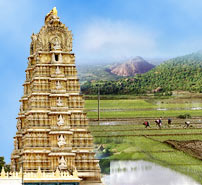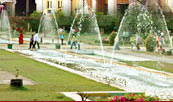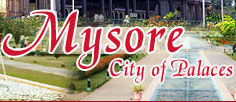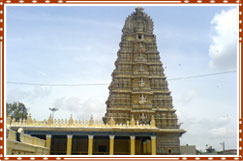 The
Chamundi Temple on top of the Chamundi hills is the most famous temple
in Mysore, since Goddess Chamundi or Chamundeshwari is the presiding
deity of Msyore. Initially the temple was a small one, but over the past
few centuries, as a result of the patronage and expansions made by the
Mysore Maharajas it has become a big temple. In the olden days, human
and animal sacrifices were regularly made at this temple, but were
stopped in the 18th century.
The
Chamundi Temple on top of the Chamundi hills is the most famous temple
in Mysore, since Goddess Chamundi or Chamundeshwari is the presiding
deity of Msyore. Initially the temple was a small one, but over the past
few centuries, as a result of the patronage and expansions made by the
Mysore Maharajas it has become a big temple. In the olden days, human
and animal sacrifices were regularly made at this temple, but were
stopped in the 18th century.The temple has a quadrangular structure. The Gopura or pyramidal tower at the entrance is intricately decorated in the Dravidian style and has a small statue of Lord Ganesha on the doorway. The doorway is silver-plated and has the images of Goddess in different forms on it. As one passes through the main gate, on the right hand side is a small statue of Lord Ganesha, the remover of all obstacles. Climb a few steps and there is a flagstaff, the footprints of the Goddess and a small statue of Nandi, facing the sanctum sanctorum.
In the sanctum sanctorum is the stone statue of the Goddess that is decorated everyday and is worshipped by a number of priests. The Mysore Maharajas have made a number of valuable gifts to their family deity. In the room in front of the sanctum sanctorum, there is a beautiful 6-foot statue of Maharaja Krishnaraja Wodeyar III. He is standing with his hands folded in his religious clothes, with his three wives; their names are carved on the pedestals. Maharaja Krishnaraja Wodeyar repaired this temple in 1827 and built the enormous tower on it. He also gifted the temple with a large wooden chariot known as the Simha Vahana, which is now used during the Rathotsava or car festival.
On top of the sanctum sanctorum is a small tower or Vimana that can be seen from outside the temple. During the 10 daylong Dasara festival special prayers are offered to the Goddess. The Vedas are chanted in the temple and various music performances are held here. After Dasara, on the auspicious Ashwayuja Pournime, a Rathotsava or car festival is conducted during the Jathra or annual festival on top of the hill. This is followed by Theppotsava (floating festival) that is held in the night. All these festivities attract devotees by the thousands.
